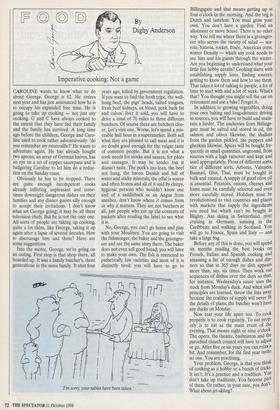Obviously he has to be stopped. There are quite enough
incompetent cooks already inflicting unpleasant and some- times downright dangerous dishes on their families and any dinner guests silly enough to accept their invitations. I don't know what set George going; it may be all these television chefs. But he is not the only one. All sorts of people are taking up cooking, quite a lot them, like George, taking it up again after a lapse of several decades. How to discourage him and them? Here are some suggestions.
Into the motor, George, we're going on an outing. First stop is that shop there, all boarded up. It was a family butcher's, three generations in the same family. It shut four years ago, killed by government regulation. If you want to find the fresh tripe, the well- hung beef, the pigs' heads, salted tongues, fresh beef kidneys, ox blood, pork back fat and calves' liver it sold, you will have to drive a total of 70 miles to three different butchers. Of course there are butchers clos- er. Let's visit one. Worse, let's spend a mis- erable half hour in a supermarket. Both sell what they are pleased to call meat and it is no doubt good enough for the vulgar taste of common people. But it is not what a cook needs for stocks and sauces, for pâtés and sausages. It may be tender but it doesn't taste. The pork's too lean, the beef not hung, the bacon Danish and full of water and sticky minerals, the offal is scarce and often frozen and all of it sold by chirpy, hygienic persons who wouldn't know one end of a saddleback or an Angus from another, don't know where it comes from or why it matters. They are not butchers at all, just people who cut up the contents of packets after reading the label to see what it is.
No, George, you can't go home and play with your Moulinex. You are going to visit the fishmonger, the baker and the greengro- cer and see the same story there. The baker does not even sell good bread; you will have to make your own. The fish is restricted to pathetically few varieties and most of it is distinctly tired; you will have to go to Tm sorry, your tables have been taken.' Billingsgate and that means getting up at four o'clock in the morning. And the veg is Dutch and tasteless. You must grow your own. You don't have a garden. Find an allotment or move house. There is no other way. You tell me where there is a greengro- cer who serves the variety of salad — sca- role, batavia, rocket, frisee, American cress, winter Density — which any cook needs to see him and his guests through the winter. Are you beginning to understand what your little fun hobby entails? Cooking starts with establishing supply lines, finding sources, getting to know them and how to use them. That takes a lot of talking to people, a lot of time to start with and a lot of work. What's that? You thought you might sell the car on retirement and use a bike? Forget it.
In addition to growing vegetables, doing your own baking and long-distance driving to sources, you will have to build and main- tain a larder. The anchovies from Billings- gate must be salted and stored in oil, the salmon and olives likewise, the shallots from the garden pickled, the peppers and gherkins likewise. Spices will be bought fre- quently in small quantities, unground, from sources with a high turnover and kept and used appropriately. Flour of different sorts, rice of different sorts, Arborio, Valencia, Basmati, Glut, Thai, must be bought in bulk and rotated. A supply of good olive oil is essential. Potatoes, onions, cheeses and hams must be carefully selected and even more carefully stored. Holidays must be revolutionised to visit countries and places with markets that supply the ingredients you need but which can't be bought in Blighty. Axe skiing in Switzerland, river cruising in Germany, sunning in the Caribbean and walking in Scotland. You will go to France, Spain and Italy — and take a large bag. Before any of this is done, you will spend six months reading the best books on French, Italian and Spanish cooking and amassing a list of enough dishes and din- ners so that in 365 days no dish appears more than, say, six times. Then work out sequences of dishes over the days so that, for instance, Wednesday's sauce uses the stock from Monday's duck. And when such principles are learned, throw the lists away because the realities of supply will never fit the details of plans; the butcher won't have any ducks on Monday. Now tear your life apart too. To cook properly is to cook regularly. To eat prop- erly is to eat as the main event of the evening. That means eight or nine o'clock. The opera, the theatre, badminton and the parochial church council will have to adjust or go. After five or six years you can relax a bit. And remember, for the first year invite no one. You are practising.
Your problem, George, is that you think of cooking as a hobby or a bunch of tricks. It isn't. It's a practice and a tradition. You don't take up traditions. You become part of them. Or rather, in your case, you don't. What about jet-skiing?


















































































 Previous page
Previous page